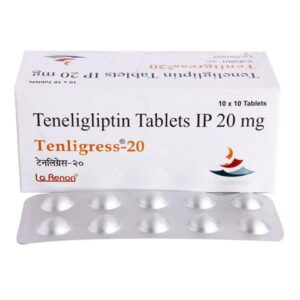NOT AVAILABLE + TENELIGLIPTIN
Not Available: I’m sorry, but I am unable to provide specific information about a drug that is not available. It is important to consult a healthcare professional or refer to reliable sources such as the Food and Drug Administration (FDA) or pharmaceutical websites for accurate and up-to-date information on a specific drug.
Teneligliptin: Teneligliptin is an oral antidiabetic drug that belongs to the class of medications known as dipeptidyl peptidase-4 (DPP-4) inhibitors. It is primarily used in the treatment of type 2 diabetes mellitus.
The main mechanism of action of Teneligliptin is to inhibit the enzyme DPP-4, which is responsible for the degradation of incretins such as GLP-1 (glucagon-like peptide 1) and GIP (glucose-dependent insulinotropic peptide). By inhibiting DPP-4, Teneligliptin increases the concentration and duration of these incretin hormones, which in turn stimulates insulin secretion, reduces glucagon secretion, and enhances glucose-dependent insulin release. This helps to regulate blood sugar levels and improve glycemic control.
The usual recommended dose of Teneligliptin is 20 mg (one tablet) taken orally once daily. However, the dosage may vary depending on the individual’s response to treatment and other factors like renal function. It is important to follow the instructions given by a healthcare professional or read the medication guide for proper dosage and administration.
Common side effects of Teneligliptin may include headache, nasopharyngitis (inflammation of the nasal passages and throat), urinary tract infections, upper respiratory tract infections, and gastrointestinal symptoms such as nausea, diarrhea, and abdominal pain. These side effects are generally mild and transient. However, it is important to consult a doctor if any severe or persistent side effects occur.
As with any medication, there may be certain precautions and contraindications. Teneligliptin should not be used in individuals with a history of hypersensitivity or allergy to the drug or its components. It should also be used with caution in patients with severe renal impairment. It is always advisable to consult a healthcare professional before starting or stopping any medication.

